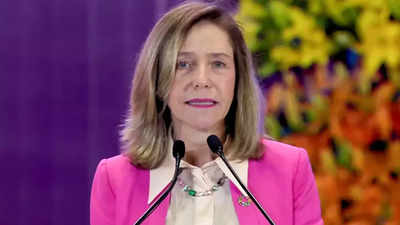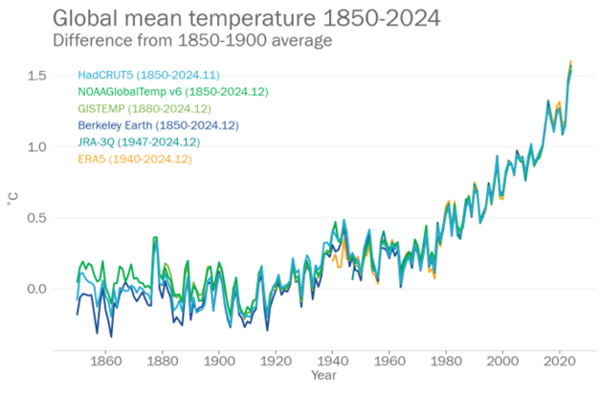NEW DELHI:
World Meteorological Organisation
(WMO) secretary-general Celeste Saulo on Tuesday said the global average temperature rise breaching the Paris Agreement threshold of 1.5 degree Celsius in 2024 doesn’t mean the global climate deal is dead.
She while referring to the average global temperature rise of 1.55 degree C in 2024 over the pre-industrial (1850-1900) period, however, termed the rise a “very grave danger” and called for decisive climate action in 2025 to reduce greenhouse gases and speed up the transition to renewable energy.
Saulo was addressing the 150th foundation day celebration which was attended by Prime Minister Narendra Modi, minister of earth science Jitendra Singh, IMD chief Mrutyunjay Mohapatra and meteorologists from India and many countries including Japan, Singapore and Oman.
Representatives of Pakistan did not attend it despite sending their prior confirmation while Bangladesh had declined its participation in advance citing restrictions on non-essential foreign travel at government expense.
Saulo’s remark on the occasion means the breaching of warming levels referred to in the Paris Agreement should be understood as temperature rise over an extended period, typically decades or longer. The temporary breach — one or more individual years exceeding 1.5 degree C — does not necessarily mean that pursuing efforts to limit the temperature increase above pre-industrial levels as stated in the Paris Agreement is out of reach.
WMO had last week confirmed that 2024 was the warmest year on record and the past ten years (2015-2024) had all been in the top ten in an extraordinary streak of record-breaking temperatures.
It said that the global average surface temperature was 1.55 degree C (with a margin of uncertainty of ± 0.13 degree C) above the 1850-1900 average, making it the first calendar year with a global mean temperature of more than 1.5 degree C above the pre-industrial level.
“Short-term temperature spikes in long-term warming can be caused by naturally occurring phenomena like El Niño, which persisted from mid-2023 to May 2024,” the WMO said.
It said, “As global warming continues, there is an urgent need for careful tracking, monitoring and communication with regard to where the warming is relative to the long-term temperature goal of the Paris Agreement, to help policymakers in their deliberations.”
Commending IMD’s role as a cornerstone of weather observation, forecasting and research across the Indian subcontinent for 150 years, Saulo said, “This legacy of dedication and innovation has enhanced India’s resilience and contributed greatly to the global good.”



